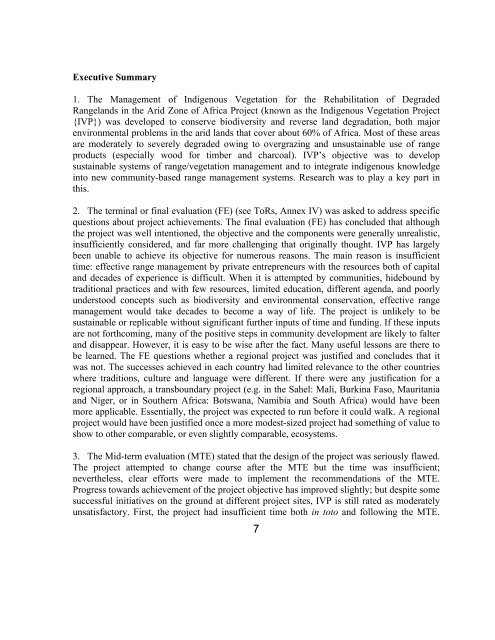Final Evaluation of the - UNEP
Final Evaluation of the - UNEP
Final Evaluation of the - UNEP
You also want an ePaper? Increase the reach of your titles
YUMPU automatically turns print PDFs into web optimized ePapers that Google loves.
Executive Summary<br />
1. The Management <strong>of</strong> Indigenous Vegetation for <strong>the</strong> Rehabilitation <strong>of</strong> Degraded<br />
Rangelands in <strong>the</strong> Arid Zone <strong>of</strong> Africa Project (known as <strong>the</strong> Indigenous Vegetation Project<br />
{IVP}) was developed to conserve biodiversity and reverse land degradation, both major<br />
environmental problems in <strong>the</strong> arid lands that cover about 60% <strong>of</strong> Africa. Most <strong>of</strong> <strong>the</strong>se areas<br />
are moderately to severely degraded owing to overgrazing and unsustainable use <strong>of</strong> range<br />
products (especially wood for timber and charcoal). IVP’s objective was to develop<br />
sustainable systems <strong>of</strong> range/vegetation management and to integrate indigenous knowledge<br />
into new community-based range management systems. Research was to play a key part in<br />
this.<br />
2. The terminal or final evaluation (FE) (see ToRs, Annex IV) was asked to address specific<br />
questions about project achievements. The final evaluation (FE) has concluded that although<br />
<strong>the</strong> project was well intentioned, <strong>the</strong> objective and <strong>the</strong> components were generally unrealistic,<br />
insufficiently considered, and far more challenging that originally thought. IVP has largely<br />
been unable to achieve its objective for numerous reasons. The main reason is insufficient<br />
time: effective range management by private entrepreneurs with <strong>the</strong> resources both <strong>of</strong> capital<br />
and decades <strong>of</strong> experience is difficult. When it is attempted by communities, hidebound by<br />
traditional practices and with few resources, limited education, different agenda, and poorly<br />
understood concepts such as biodiversity and environmental conservation, effective range<br />
management would take decades to become a way <strong>of</strong> life. The project is unlikely to be<br />
sustainable or replicable without significant fur<strong>the</strong>r inputs <strong>of</strong> time and funding. If <strong>the</strong>se inputs<br />
are not forthcoming, many <strong>of</strong> <strong>the</strong> positive steps in community development are likely to falter<br />
and disappear. However, it is easy to be wise after <strong>the</strong> fact. Many useful lessons are <strong>the</strong>re to<br />
be learned. The FE questions whe<strong>the</strong>r a regional project was justified and concludes that it<br />
was not. The successes achieved in each country had limited relevance to <strong>the</strong> o<strong>the</strong>r countries<br />
where traditions, culture and language were different. If <strong>the</strong>re were any justification for a<br />
regional approach, a transboundary project (e.g. in <strong>the</strong> Sahel: Mali, Burkina Faso, Mauritania<br />
and Niger, or in Sou<strong>the</strong>rn Africa: Botswana, Namibia and South Africa) would have been<br />
more applicable. Essentially, <strong>the</strong> project was expected to run before it could walk. A regional<br />
project would have been justified once a more modest-sized project had something <strong>of</strong> value to<br />
show to o<strong>the</strong>r comparable, or even slightly comparable, ecosystems.<br />
3. The Mid-term evaluation (MTE) stated that <strong>the</strong> design <strong>of</strong> <strong>the</strong> project was seriously flawed.<br />
The project attempted to change course after <strong>the</strong> MTE but <strong>the</strong> time was insufficient;<br />
never<strong>the</strong>less, clear efforts were made to implement <strong>the</strong> recommendations <strong>of</strong> <strong>the</strong> MTE.<br />
Progress towards achievement <strong>of</strong> <strong>the</strong> project objective has improved slightly; but despite some<br />
successful initiatives on <strong>the</strong> ground at different project sites, IVP is still rated as moderately<br />
unsatisfactory. First, <strong>the</strong> project had insufficient time both in toto and following <strong>the</strong> MTE.<br />
7

















